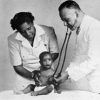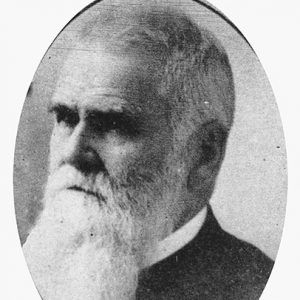calsfoundation@cals.org
William Blackwell Welch (1828–1917)
In the late nineteenth century, physician William Blackwell Welch was a leader in the movement to modernize medicine in Arkansas. A cofounder and first president of the Arkansas Medical Society (AMS), he later led the effort to establish a city hospital in Fayetteville (Washington County).
W. B. Welch was born on December 9, 1828, in Scottsville, Kentucky, to Christopher A. Welch, who was a farmer, and his wife, Elizabeth Lyles Welch. In 1829, his family, which eventually included two brothers and three sisters, moved to Somerville, Alabama. He attended schools in Huntsville, Alabama, and studied medicine under his older brother. After graduating from Tennessee’s University of Nashville medical department (later merged with the Vanderbilt University Medical School) in 1849, he returned to Alabama and began practicing medicine and farming.
In 1851, he married Laura F. McClellan, who was from Alabama. The couple had no surviving children. In 1855, he moved to Cane Hill (Washington County).
From 1862 to 1865, he served as a Confederate army surgeon in Company B of the Thirty-fourth Arkansas Infantry Regiment. Welch’s regiment saw action at the battles of Prairie Grove, Helena, and Jenkins’ Ferry. In 1883, his account of a surgical case following the Battle of Prairie Grove appeared in the multivolume Medical and Surgical History of the War of the Rebellion.
After the war, he resumed practicing medicine in Cane Hill before moving to Fayetteville in 1881. From 1887 to 1893, he served on the board of trustees for Arkansas Industrial University, now the University of Arkansas (UA) in Fayetteville. In the 1870s, as Arkansas’s regular physicians began to engage in professional organizing and advocacy, he emerged as one of the movement’s leaders. In 1872, he cofounded and served as the first vice president of the Washington County Medical Society. Although elected president of the Arkansas State Medical Association in 1874, he soon resigned due to discord within the organization.
From 1875 to 1877, Welch served as the first president of the Arkansas Medical Society. Addressing the AMS’s annual meeting in 1877, he urged members to support such advances as improved medical education, the establishment of a state mental health facility, and the creation of a permanent state board of health. Opened in 1883, the Arkansas State Lunatic Asylum (later the Arkansas State Hospital) received the AMS’s support.
At the AMS’s annual meeting in 1880, Dr. Philo Oliver Hooper, the dean of faculty for the Arkansas Industrial University medical department (now the University of Arkansas for Medical Sciences—UAMS), requested that an AMS committee attend the school’s commencement. The AMS adopted Welch’s resolution, requiring the society to “annually appoint a [five-member] Board of Visitors [to] attend [the medical school’s] commencement and witness the examination of candidates for graduation.” In 1881, the Visitors Board, of which Welch was a member, reported that “ten candidates for graduation were examined” and praised the faculty’s “success in raising the standard of medical education.” The Visitors Board existed until 1919.
In 1876, Welch served on an American Medical Association–appointed committee that addressed Arkansas’s need for a permanent state board of health. In 1877, Welch explained that the committee had “addressed a memorial to the state legislature in the interest of [a health board] law, and prepared a bill,” which did not receive a hearing before the state legislature. Despite this experience, Welch insisted that “a state board of health…should have [a legislature’s] earnest attention.” Following its creation in 1913, AMS members served on Arkansas’s first permanent state board of health.
In 1902, after his first wife’s death, he married Julia A. Garside, who was from Tennessee. They had no surviving children.
In 1909, Welch and a small group of investors began working to establish a hospital in Fayetteville. Following the opening of the Fayetteville City Hospital in 1912, Welch served as president of its medical staff and managing board. From 1991 until it closed in 2012, the Fayetteville City Hospital operated as a long-term care facility.
Following Welch’s death on March 9, 1917, in Fayetteville, the AMS eulogized him “as a giant of organized medicine.” He is buried in Evergreen Cemetery.
For additional information:
“Dr. W. B. Welch Annual Address.” Transactions of the Arkansas Medical Society 2 (1877): 1–22.
“Dr. W. B. Welch Dead.” Fayetteville Democrat, March 10, 1917, p. 1.
“General Session, Third Day.” Journal of the Arkansas Medical Society 14 (June 1917): 22–23.
History of Northwest Arkansas. Chicago: Goodspeed Publishing Co., 1889.
Hale, Harrison. University of Arkansas, 1871–1948. Fayetteville: University of Arkansas Alumni Association, 1948.
Lesh, Ruth Ellis. “65 Years of Service July 1912 Fayetteville City Hospital.” Flashback 27 (May 1977): 21–29.
The Medical and Surgical History of the War of the Rebellion, 1861–1865. Vol. 2, Part 3: Surgical History: Wounds and Injuries of the Lower Extremities. Washington DC: Government Printing Office, 1883.
“Pioneer Spirit Shaped Destiny of City Hospital.” Northwest Arkansas Times, May 10, 1987, p. 3.
“Report of the Board of Visitors.” Transactions of the Arkansas Medical Society 6 (1881): 1–16.
“Second Day’s Proceedings.” Transactions of the Arkansas Medical Society 5 (1880): 1–19.
Singleton, E. Mitchell. “Hot Springs Physicians and the Formation of the Arkansas Medical Society.” The Record (2012): 65–68.
Walsh, Joel. “Board Given New Life.” Northwest Arkansas Times, July 1, 2011, pp. 1, 2.
———. “Future Unclear for Charities.” Northwest Arkansas Times, August 23, 2012, pp. 1, 2.
Melanie K. Welch
Mayflower, Arkansas







Comments
No comments on this entry yet.